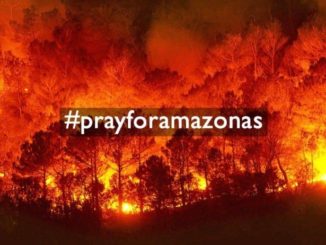
SANTIAGO – Pope Francis urged Chile’s indigenous Mapuche people on Wednesday to shun violence, saying unity was the best weapon against “the deforestation of hope,” as they struggle to defend their culture and reclaim ancestral lands.
“Violence eventually turns a most just cause into a lie,” he told an exuberant crowd of about 150,000 mostly Mapuche on a military airfield in southern Chile.
In the run-up to his visit, the Araucania region that is the heartland of the Mapuche has been hit by repeated attacks by protesters who have burned or bombed churches, logging trucks and schoolhouses. On the morning of Francis’ arrival, a church, a schoolhouse and three helicopters used to fight fires in the heavily forested region were set on fire.
Groups tied to Mapuche causes have reportedly claimed responsibility for past attacks, though it is not clear to what extent they have broader support among indigenous communities and there was no sign of dissent in Wednesday’s joyful crowd.
At the start of a Mass, Mapuche dressed in traditional garb of colorful weaved ponchos and headbands made of silver trinkets played indigenous wind instruments and small drums.

They chanted and danced before the altar as if to bless and welcome the important visitor and during the Mass a traditional horn was used instead of bells to accompany the most sacred parts of the liturgy.
“A culture of mutual esteem may not be based on acts of violence and destruction that end up taking human lives,” Francis said after starting his homily with the Mapuche phrases for “Good morning” and “Peace be with you.”
Indigenous communities of south-central Chile have long accused the state and private companies of taking their ancestral land, stripping it of natural resources and using heavy-handed enforcement against their communities.
Around 600,000 Mapuche live in Chile, many in the forested, hilly provinces ringed by volcanoes and lakes of Araucania and Bio Bio, roughly 650 km south of Santiago.
“Solidarity … is the only weapon we have against the ‘deforestation of hope,” Francis said. He quoted national poets on the struggles of Chileans and the beauty of their land.
Pope Francis meets Chile sex abuse victims; ‘cries with them’
Mapuche relations with the state and settlers of European descent have been fractious since the Chilean army invaded the territory of the Mapuche in the late 19th century.
Francis, whose homily was interrupted repeatedly by applause and at times by the blowing of tribal instruments, asked for a moment of silence for those who had suffered “so much pain and injustice” in the past.
Last year, Chilean President Michelle Bachelet asked for forgiveness from the Mapuche community for such “errors and horrors.” Her government accelerated a land transfer program that gives property titles to indigenous communities, and launched initiatives to improve infrastructure and access to drinking water in remote areas.
Still, the Araucania region that is home to the majority of the country’s Mapuche is the poorest in the country, with nearly a quarter of its residents living below the poverty line, according to a 2015 survey by Chile’s Ministry of Social Development.
A recent, high-profile hunger strike by four Mapuche men accused of setting fire to an evangelical church in 2016 raised the profile of the issue among Chileans.
The Maquehue airfield near Temuco, where the pope celebrated Mass on Wednesday, was one of the principal detention and torture centers of the Araucania region during the early days of the 1973-1990 dictatorship of the late Augusto Pinochet after the overthrow of democratically elected President Salvador Allende.
“(This place) was the site of grave violations of human rights. We offer this Mass for all those who suffered and died, and for those who daily bear the burden of those many injustices,” Francis said.
After the Mass, Francis was sharing a meal with Mapuche representatives before he was due to return to the Chilean capital to meet young people and university students.-MercoPress



